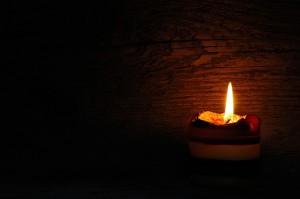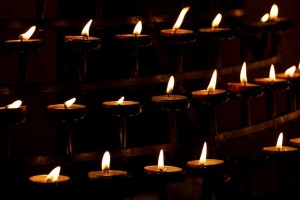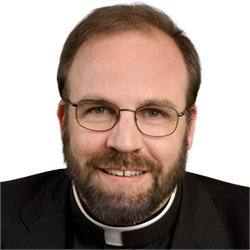 This weekend’s upcoming release of 50 Shades of Grey has inspired a flurry of Catholic bloggers to take to their keyboards to thoughtfully and truthfully educate Catholics (and any others willing to listen) about how the film’s message promotes the degradation and objectification of the human person through the glorification of sexual violence against women. Bishop Aquila wrote a nice piece explaining the Theology of the Body’s vision of authentic human love and sexuality. Joe Heschmeyer wrote an interesting essay for First Things looking at 50 Shades as a cultural push-back against the gender neutrality movement and as indicative of a sociocultural desire for authentic masculine virtue. Matt Fradd offered a video 50 Things You Should Know about 50 Shades of Grey . Teresa Tomeo wrote an article about how we have moved culturally into a “grey area” as evidenced by our inability to recognize the objective (black and white) truth. There have been other great articles written as well.
This weekend’s upcoming release of 50 Shades of Grey has inspired a flurry of Catholic bloggers to take to their keyboards to thoughtfully and truthfully educate Catholics (and any others willing to listen) about how the film’s message promotes the degradation and objectification of the human person through the glorification of sexual violence against women. Bishop Aquila wrote a nice piece explaining the Theology of the Body’s vision of authentic human love and sexuality. Joe Heschmeyer wrote an interesting essay for First Things looking at 50 Shades as a cultural push-back against the gender neutrality movement and as indicative of a sociocultural desire for authentic masculine virtue. Matt Fradd offered a video 50 Things You Should Know about 50 Shades of Grey . Teresa Tomeo wrote an article about how we have moved culturally into a “grey area” as evidenced by our inability to recognize the objective (black and white) truth. There have been other great articles written as well.
Raising Little Angels is a monthly post about the struggles, joys, confusions, and questions that come with parenting. The tongue-in-cheek title refers to the fact that parenting often feels like anything but an angelic endeavor. After all, we don’t want little angels; we want little saints!
This is a guest post by Becky Needham, a friend of PsychedCatholic, and a personal friend. Becky is a wife and stay-at-home mom writing from Catonsville, MD. She and her husband Trevor have been married eight years and have three children, John Paul, Clare and Joshua. In between homeschooling and working in college campus ministry, she loves music, DIY home projects and enjoying the outdoors with her family.
My husband Trevor and I have been at this parenting thing for  six years now. And even with all our know-how, a degree in Theology and Religious Education, teaching religion in our home school co-op, and three kids later, you’d THINK our own family prayer time would be a walk in the park by now. I can lead everyone ELSE’s kids in prayer just fine. Religion class, vacation Bible school, youth retreats – you name it, I’ve done it. But leading our kids in prayer has always been a bit more challenging, if not altogether unholy. Our six year old, the rule-follower, is fine. Angelic, really. Heck, he’s the one actually leading prayers half the time while Trev and I are distracted trying to get the other two kids to just sit down for five seconds. John Paul will be perfectly singing the Salve Regina while Joshua and Clare are launching themselves off the coffee table into the couch or the dog – or better yet, into one of us. Knees first. Unfortunately, the family activity that’s supposed to gather us together, calm our hearts and lead us all to bed in peace, instead leaves Trev and I shaking our heads and wondering if anything we’re doing is really worth it in the end. We sure don’t feel any holier ending the day yelling at everyone to just “Sit still and pray, jeepers!”
six years now. And even with all our know-how, a degree in Theology and Religious Education, teaching religion in our home school co-op, and three kids later, you’d THINK our own family prayer time would be a walk in the park by now. I can lead everyone ELSE’s kids in prayer just fine. Religion class, vacation Bible school, youth retreats – you name it, I’ve done it. But leading our kids in prayer has always been a bit more challenging, if not altogether unholy. Our six year old, the rule-follower, is fine. Angelic, really. Heck, he’s the one actually leading prayers half the time while Trev and I are distracted trying to get the other two kids to just sit down for five seconds. John Paul will be perfectly singing the Salve Regina while Joshua and Clare are launching themselves off the coffee table into the couch or the dog – or better yet, into one of us. Knees first. Unfortunately, the family activity that’s supposed to gather us together, calm our hearts and lead us all to bed in peace, instead leaves Trev and I shaking our heads and wondering if anything we’re doing is really worth it in the end. We sure don’t feel any holier ending the day yelling at everyone to just “Sit still and pray, jeepers!”
 In my last post I offered a basic sketch of the cognitive-behavioral model of psychological distress. By way of quick, pithy review: the way you THINK gives rise to the way you FEEL and BEHAVE. So, understanding our thoughts is important if we want to understand our feelings and behaviors.
In my last post I offered a basic sketch of the cognitive-behavioral model of psychological distress. By way of quick, pithy review: the way you THINK gives rise to the way you FEEL and BEHAVE. So, understanding our thoughts is important if we want to understand our feelings and behaviors.
 In my last post I discussed some considerations that one might take into account as they discern whether they are ready to take psychotropic medication. As a follow-up to that post I want to explore some practical, non-medication related suggestions for coping with anxiety and depression, as well as discuss 10 common thought errors/distortions that cause many of us difficulty. In order to do this, however, It is necessary to provide some background on the various ways psychological disturbances are conceptualized.
In my last post I discussed some considerations that one might take into account as they discern whether they are ready to take psychotropic medication. As a follow-up to that post I want to explore some practical, non-medication related suggestions for coping with anxiety and depression, as well as discuss 10 common thought errors/distortions that cause many of us difficulty. In order to do this, however, It is necessary to provide some background on the various ways psychological disturbances are conceptualized.
 A soft golden light, emanating from the hanging, yellowish-gold sconces, illuminated most of the church. The apse was shallow, not extending back very far, it’s vaulted ceiling obscured by a thick, plain, wooden border. The apse was unlit and remained relatively untouched by the light, though the tabernacle was faintly visible in the darkness.
A soft golden light, emanating from the hanging, yellowish-gold sconces, illuminated most of the church. The apse was shallow, not extending back very far, it’s vaulted ceiling obscured by a thick, plain, wooden border. The apse was unlit and remained relatively untouched by the light, though the tabernacle was faintly visible in the darkness.
Msgr. Charles Pope is the pastor of Holy Comforter-St. Cyprian, a parish community in Washington, DC. He attended Mount Saint Mary’s Seminary and was ordained in 1989. Msgr. Pope writes thoughtful, relevant, (near) daily blog posts for the Archdiocese of Washington, DC, which can be read here. His pieces are frequently carried by New Advent and Big Pulpit.
Monsignor graciously agreed to contribute a personal piece detailing his own journey to psychological and spiritual healing through the process of overcoming anxiety and depression.
 When I was growing up older folks often spoke of a “mid-life crisis.” Hitting forty was usually the critical period they had in mind. These days I’ve noticed it hits a lot sooner. Maybe it’s because we live in a “youth culture” that forces the questions of aging and being successful a lot quicker. Maybe it’s just the stress. But these days, there’s just something about the mid-thirties that hits a lot of folks. I was no exception. My mid-thirties were difficult years for me—years filled with anxiety and self-doubt.
When I was growing up older folks often spoke of a “mid-life crisis.” Hitting forty was usually the critical period they had in mind. These days I’ve noticed it hits a lot sooner. Maybe it’s because we live in a “youth culture” that forces the questions of aging and being successful a lot quicker. Maybe it’s just the stress. But these days, there’s just something about the mid-thirties that hits a lot of folks. I was no exception. My mid-thirties were difficult years for me—years filled with anxiety and self-doubt.